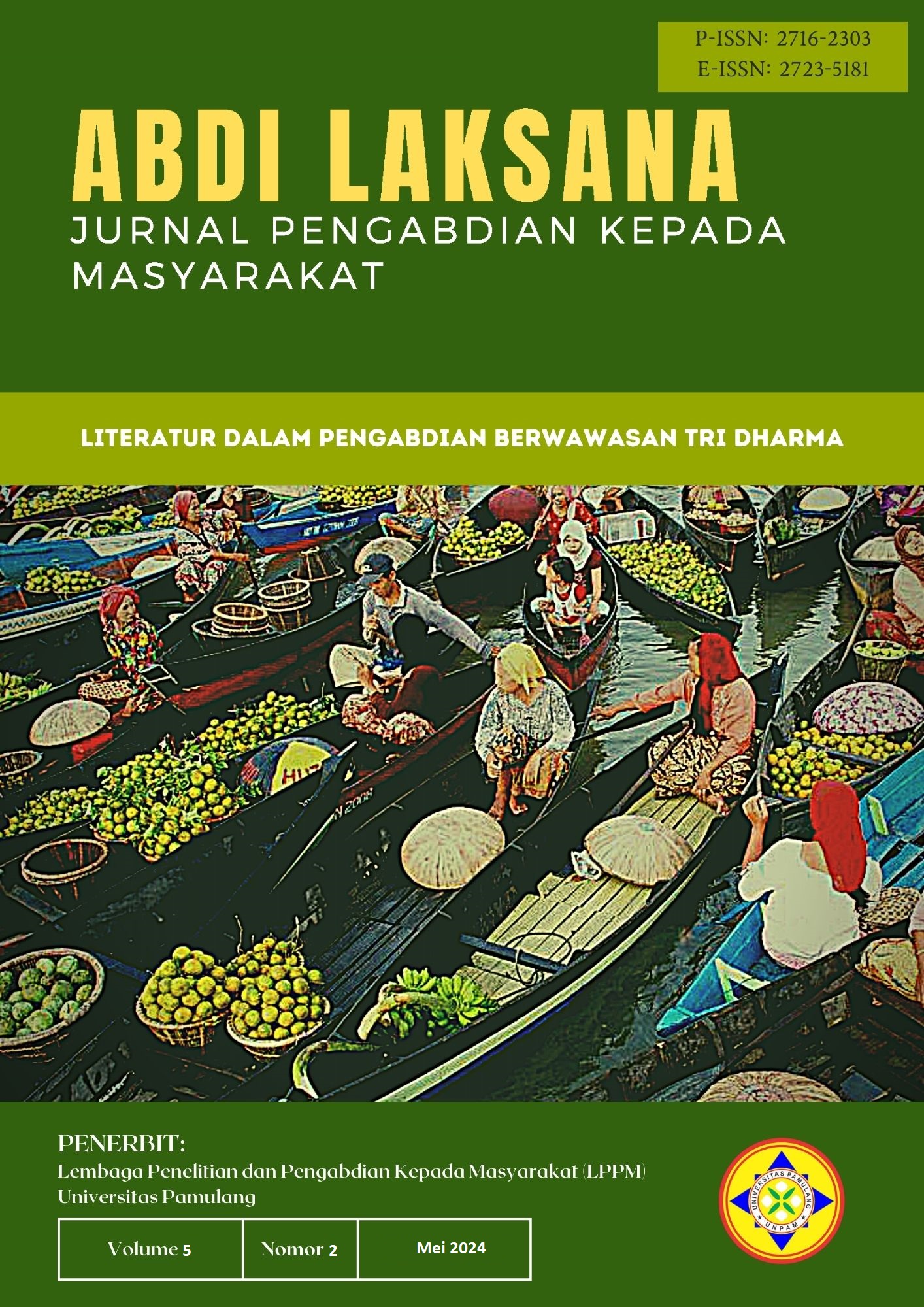PENYULUHAN HUKUM: KESADARAN HUKUM PADA ANAK YANG BERHADAPAN DENGAN HUKUM PADA ANAK BINAAN DI LAPAS KHUSUS ANAK (LPKA) KELAS IIA JAKARTA
DOI:
https://doi.org/10.32493/abdilaksana.v5i2.40781Keywords:
Anak berhadapan hukum, masyarakat, perilakuAbstract
Tujuan dari kegiatan pengabdian kepada masyarakat ini adalah untuk dapat meningkatkan pemahaman tentang Anak Berhadapan dengan Hukum (ABH) bagi anak-anak. Anak Berhadapan Hukum dapat disebut sebagai Anak yang Berkonflik dengan Hukum yang selanjutnya disebut Anak adalah anak yang telah berumur 12 (dua belas) tahun, tetapi belum berumur 18 (delapan belas) tahun yang diduga melakukan tindak pidana. Beberapa dampak negatif yang dialami oleh ABH diantaranya anak mengalami diskriminasi, menjadi kurang percaya diri, serta memperoleh perundungan oleh lingkungan sebayanya. Tidak jarang ABH, baik itu pelaku, saksi atau bahkan korban menjadi tertekan dan akhirnya mengalami depresi dengan kondisi ini. pentingnya untuk menjaga nama ataupun privasi dari anak menjadi hal terpenting dalam proses hukum. Hasil dari kegiatan ini, Pertama diharapkan bisa memberikan pemahaman kepada ABH agar dapat mencegah anak-anak lain untuk tidak berhadapan dengan hukum. Kedua, apabila terdapat anak yang telah berhadapan dengan hukum, maka berusaha untuk dapat memberikan pemahaman kepada para anak-anak tersebut agar mereka tidak mengulangi perbuatannya, sehingga pertumbuhan anak-anak yang berhadapan hukum terus dapat diminalisir. Dampak dari kegiatan ini adalah para anak-anak dan orang tua memahami dan mengerti tentang apa yang perlu untuk dilakukan ketika berhadapan dengan hukum.
References
Cross, T. P., Fine, J. E., Jones, L. M., & Walsh, W. A. (2012). Mental Health Professionals in Children’s Advocacy Centers: Is There Role Conflict? Journal of Child Sexual Abuse, 21(1), 91–108. https://doi.org/10.1080/10538712.2012.642466
Ferguson, L. (2021). Vulnerable children’s right to education, school exclusion, and pandemic law-making. Emotional and Behavioural Difficulties, 26(1), 101–115. https://doi.org/10.1080/13632752.2021.1913351
Fowler, C., & Rittenour, C. (2017). A Life-Span Approach to Children-In-Law’s Perceptions of Parent-In-Law Communication. Journal of Family Communication, 17(3), 254–272. https://doi.org/10.1080/15267431.2017.1281280
Francia, L., & Millear, P. (2015). Mastery or Misery: Conflict Between Separated Parents a Psychological Burden for Children. Journal of Divorce & Remarriage, 56(7), 551–568. https://doi.org/10.1080/10502556.2015.1080090
Lecoyer, K., & Simon, C. (2015). The multicultural family in conflict: Legal and socio- anthropological perspectives on child residency. The Journal of Legal Pluralism and Unofficial Law, 47(2), 190–207. https://doi.org/10.1080/07329113.2015.1090226
Mikucki-Enyart, S. L., Caughlin, J. P., & Rittenour, C. E. (2015). Content and Relational Implications of Children-In-Law’s Relational Uncertainty Within the In-Law Dyad During the Transition to Extended Family. Communication Quarterly, 63(3), 286–309. https://doi.org/10.1080/01463373.2015.1039714
Mokiwa, S. A. N., & Tlale, L. D. N. (2015). Promoting Digital Literacy for Children in Conflict with the Law: The Open Distance Learning Potential. Journal of Social Sciences, 45(3), 190–198. https://doi.org/10.1080/09718923.2015.11893501
Moritz, D., & Christensen, L. S. (2020). When sexting conflicts with child sexual abuse material: The legal and social consequences for children. Psychiatry, Psychology and Law, 27(5), 815–830. https://doi.org/10.1080/13218719.2020.1742242
Nyangoma, A., Ebila, F., & Omona, J. (2019). Child Sexual Abuse and Situational Context: Children’s Experiences in Post-Conflict Northern Uganda. Journal of Child Sexual Abuse, 28(8), 907–926. https://doi.org/10.1080/10538712.2019.1660445
Peleg, N. (2018). Illusion of inclusion: Challenging universalistic conceptions in international children’s rights law. Australian Journal of Human Rights, 24(3), 326–344. https://doi.org/10.1080/1323238X.2018.1542924
Shah, M. G. (2020). Children of conflict: An analysis of the Jammu and Kashmir Juvenile Justice (Care and Protection of Children) Act, 2013. Indian Law Review, 4(1), 105–119. https://doi.org/10.1080/24730580.2019.1703490
Sheehan, R., & Tilbury, C. (2019). Children and the Law: Contemporary Approaches to Children and Vulnerability. Australian Social Work, 72(4), 387–388. https://doi.org/10.1080/0312407X.2019.1626484
Target, M., Hertzmann, L., Midgley, N., Casey, P., & Lassri, D. (2017). Parents’ experience of child contact within entrenched conflict families following separation and divorce: A qualitative study. Psychoanalytic Psychotherapy, 31(2), 218–246. https://doi.org/10.1080/02668734.2016.1268197
Treloar, R. (2018). High-conflict divorce involving children: Parents’ meaning-making and agency. Journal of Social Welfare and Family Law, 40(3), 340–361. https://doi.org/10.1080/09649069.2018.1493652
Watson, A. M. S. (2015). Resilience is its own resistance: The place of children in post-conflict settlement. Critical Studies on Security, 3(1), 47–61. https://doi.org/10.1080/21624887.2015.1014687
Wintz, G., & Abdul-Majied, S. (2021). Children’s conflict: Views of Caribbean early childhood teachers in Guyana and Trinidad and Tobago. International Journal of Early Years Education, 1–15. https://doi.org/10.1080/09669760.2020.1865135
Published
Issue
Section
License

This work is licensed under a Creative Commons Attribution-ShareAlike 4.0 International License.



 PUBLICATION ETHICS
PUBLICATION ETHICS FOCUS AND SCOPE
FOCUS AND SCOPE EDITORIAL TEAM
EDITORIAL TEAM REVIEW PROCESS
REVIEW PROCESS CONTACT US
CONTACT US AUTHOR GUIDELINES
AUTHOR GUIDELINES



